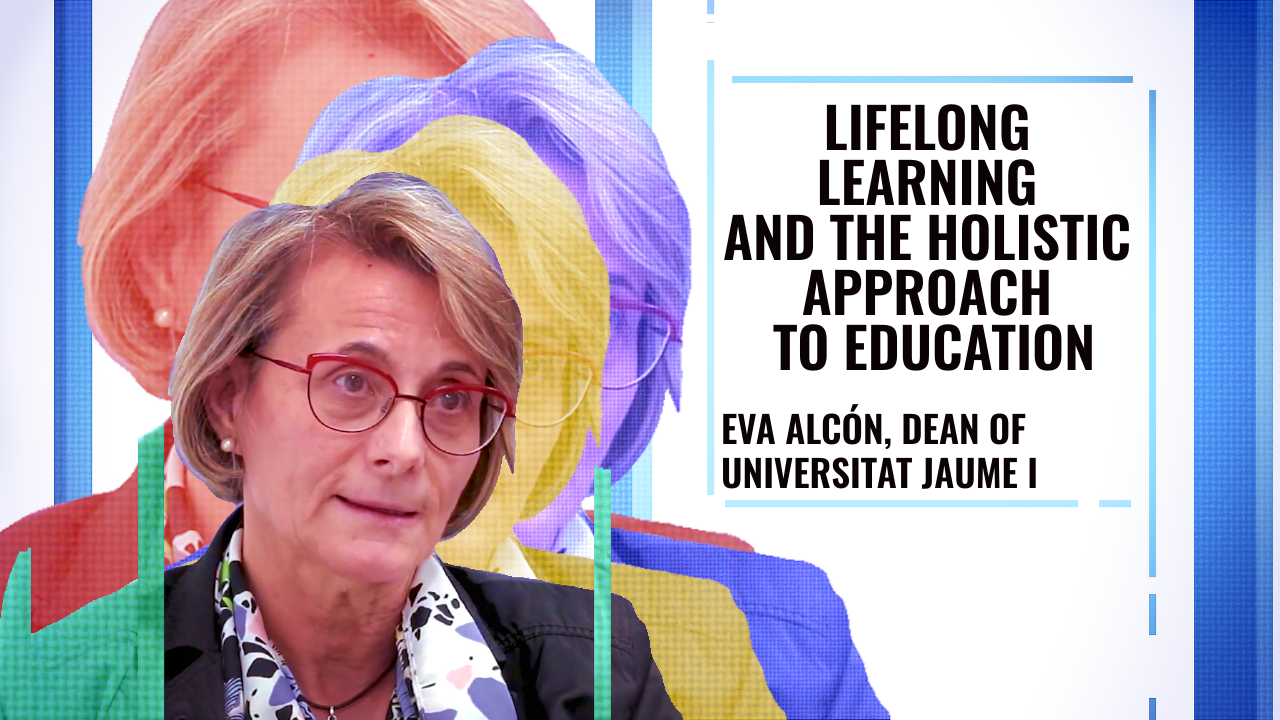Universitat Jaume I’s Dean, Eva Alcón, reflects on the challenges facing higher education, the revival of lifelong learning, and the role of universities in modern society.
Transcript
The challenges facing higher education
Eva Alcón: I believe that there are several challenges. Universities are dedicated mainly to generate knowledge, to transmit that knowledge and, somehow, to transform the regions in which the universities are located. I believe we would have to differentiate the various acting scopes that universities have: in the research scope, I think the biggest challenge we have is not to generate knowledge, because we create knowledge at the universities and we do that well, but the biggest problem is how to deliver that knowledge to society and turn it into innovation.
I believe that is a big challenge that we have at research. In the teaching field, I believe we form people, we form people in formal studies, in graduate, in postgraduate, and in our own studies. I believe that the big challenge here is, on the one hand, to incorporate the new technologies to teaching, not as a thing added to teaching, but as an instrument to improve and innovate teaching.
The other challenge we have at teaching is lifelong learning. Learning through life. I’m talking not only about people over 55 years old going to universities, which is very consolidated in universities in Spain but that knowledge that we’re going to be building as we go through our professional life.
A few years ago, we studied for a degree, and with that knowledge, we had enough for the rest of our lives. That does not work anymore. We need to go towards an integral formation of the person, much more transversal, and later to be much more flexible to adapt that knowledge to the realities that we are going to face and, at the same time, return to the universities to continue growing inside that flexibility.
Lifelong learning at the Universitat Jaume I
Eva Alcón: The university for elders, I think it’s an example of what the formation should be the formation at a certain age. When someone is not looking for a title, when someone doesn’t even look to adapt inside that flexibility, but, in a way, it implies active aging inside this society we’re going to. As you said, we are going to live longer; it is a crucial factor and a formation we have.
Another formation we have is destined to adapt to the new necessities that the work market requires. We are making a great effort to connect the university with the production sector, and v. I like saying that this relationship has to be bi-directional, I mean, the enterprises need to know what the universities can offer but, at the same time, the university must understand what the enterprise needs.
We are very lucky to have a scientific and technological park in our university, which is called SPAITEC. An innovative ecosystem. That park, SPAITEC, will gain strength, because each month they contribute…, these enterprises that are in contact with the university and the enterprises will have to contribute more to the university and the university to the enterprises.
I believe that those are some of the challenges we have. Other challenges we have are educational innovations and, as I have said, information technologies and communication, that digital transformation that universities are going to have to undergo, as well as other institutions and companies.
Role of universities in society
Eva Alcón: Universities have a significant impact on their territory, we are motors of socio-economic transformation, and the Universitat Jaume I is a wonderful example of that. For example, in cultural issues, we work hand in hand with the institutions, we’re hand in hand with the town hall, with the Generalitat. For what? Well, to make of Castellón a culture catalyzer, where somehow we sum strengths, we look for synergies, so people have access to culture. We understand culture as an added value.
We understand that the university or we would like that the university is the mirror in which society looks itself. That’s why it’s so vital for us to celebrate days like the Day against Gender Violence, like the Day of People with Disabilities, the Linguistic Diversity Day, why? Because, in this way, we can add value in what we are as a university, a plural university, an inclusive university, a university where race doesn’t matter, where it doesn’t matter where you come from, you’re going to have a place here. A university where we bet on equality.
We have more scholarships no. We have our scholarship program to avoid anyone being left out of the university for economic reasons. We have made a great effort, so the scholarship information is all, somehow, added. When our students get to the university they can have access to all the information that exists and can plan their learning process because we shouldn’t forget that, for us, students should have access to opportunities. They should have a warranty to be able to continue their studies and avoid failure. Once they enter the university, it is one of our priorities along with employability; with favoring the conditions for that employability.
A holistic approach to education
Eva Alcón: I believe that, in the university, we form people to facilitate the professional insertion, the work insertion, and from there the curricular contents of the degrees. I also like to say that the road during the university is not just…, well we take care of forming professionals, but mainly we form people.
All this integral formation is growing every day. We need people that are capable of working in teams. We need people able to communicate and to do so in more than one language. We need people capable of leading projects, of searching for consensus. We need people capable of dealing with the new technologies, and also provide a humanistic view of the use of the latest technologies. All this implies going over just the curricular content of the study programs, but that is our challenge. Our challenge is how to educate critical citizenship that will have to live in even more global work, ever-changing, becoming more flexible, well, and we are there.
This article from Observatory of the Institute for the Future of Education may be shared under the terms of the license CC BY-NC-SA 4.0 
)
)


)